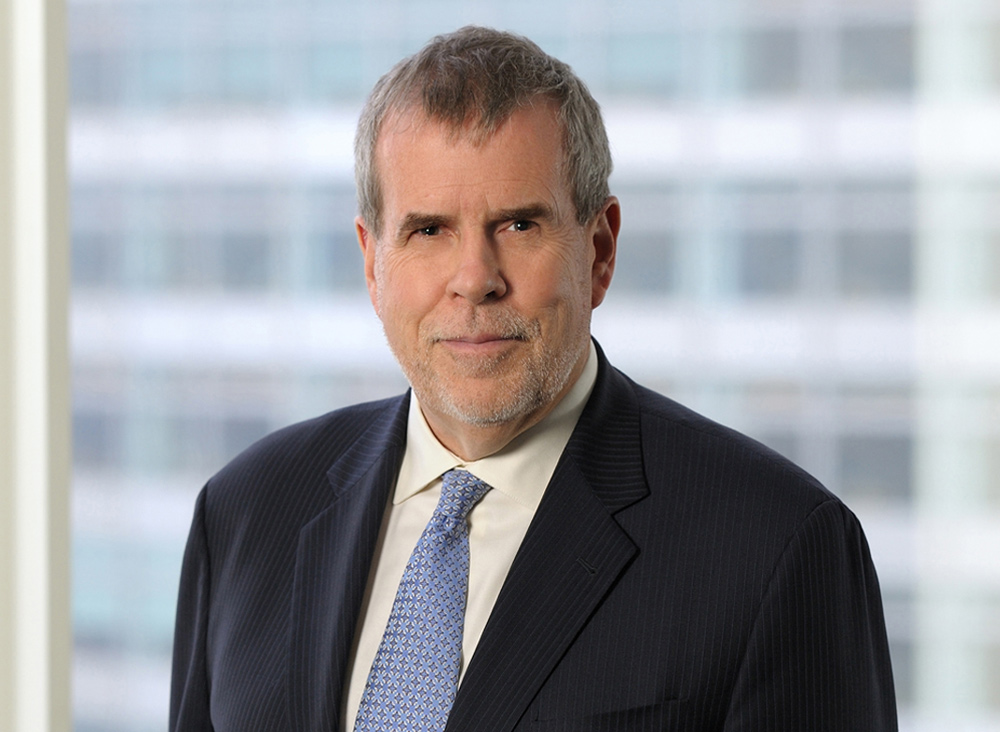Fordham Law Alumni Association

“I Believe in
Showing Up”
A Q&A with Incoming FLAA President
Edward M. Joyce ’86

For the Fordham Law Alumni Association’s new president, the Law School is not just close to his heart—it’s family. In this Q&A, he talks about what Fordham Law means to him, the role service plays in his life, and how he plans to use his passion to bring growing numbers of alumni into the fold.
A. I’ll never forget the time during our orientation in the fall of 1983 when John Feerick gave a speech in the old Lowenstein Auditorium. I was 22, and he had graduated from Fordham the year I was born. I was immediately taken by him. There are some people who have a bedside manner and others who don’t, and John truly has empathy. He was always looking to figure out how to help you, both as a student and once you graduated. I also fell in love with my professors, including Hugh Hansen, Maria Marcus, Joseph Perillo, and Georgene Vairo, among others. After my first year, I wrote on to both the International Law Journal and the Urban Law Journal, and I joined the ULJ—eventually becoming a commentary editor during my third year. My daughter, Kayla, is also on the ULJ, and the first thing she saw when she walked into the journal’s office was a photograph of me as a student—with a lot of big hair. I also did moot court. The ULJ and moot court offices were right across the hall from each other in the old building, which was very convenient, since I was spending 24/7 on campus during the week.
Q. You talk about John Feerick as a big influence on you. How did he affect your life and thinking?
A. First, I really feel that John took the Law School from a good New York City law school to a global institution with an incredible reputation. He was also the person who came up with the motto: In the service of others, which is not only about looking out for our brother-and-sister alumni but also about what we do on a pro bono basis, and how we give back. I’m very involved with ALYN Hospital, a pediatric rehabilitation facility in Israel. The patients, staff, and doctors there are a mix of Muslims, Christians, and Jews. The Middle East and Northern Ireland are two places in the world that people thought would never resolve their conflicts. John was involved in resolving conflicts with the latter, and that’s in the back of my mind in terms of my involvement with ALYN.
Q. What was your path to becoming FLAA president?
A. When John Feerick was dean, he started the Young Alumni Committee [now called the Recent Graduates Committee], which I joined with my classmate Mike Stanton ’86. Mike and I chaired every five-year reunion together with other classmates, and our class has always been really special. For our 25th reunion, we got a record-breaking 47% to donate, which was incredible. Instead of setting a goal for a dollar amount, we focused on getting participation numbers up, which we guaranteed would result in breaking the fundraising record, and it did. Our class gets very competitive about fundraising, in a good way, to get other classes to try and beat us. As for the FLAA, I’ve been on the board since 2014 in different positions, but I was very involved as an alumnus right out the door.
Q. What are you most excited about in terms of your new role?
A. I believe in showing up. While fundraising is important, I’m focusing my efforts on participation. I think it’s important for alumni to participate at whatever level they can, to volunteer to do things, and to show up. Now, as COVID restrictions begin to ease, I’m excited to go to more in-person receptions across the country, and maybe even overseas, depending on the pandemic travel restrictions. The FLAA now has more affinity groups than ever, and I believe they are an important avenue for getting people in all locations and of all persuasions involved. It’s about engaging alumni and making them excited to attend things in person again. Fundraising will flow from that. But we also need to focus on technology, which COVID has accelerated. We need to make sure we’re reaching people on the social media platforms that our younger alumni are using.
Q. Do you have a message for FL alumni about why they should get involved?
A. Fordham Law has an incredible network. We are good at interacting with and looking out for one another. It goes beyond helping new law graduates get jobs. In 2000, I was able to move from Anderson Kill & Olick to Heller Ehrman because a fellow classmate, Kevin Toner ’86, picked up the phone to let me know that Heller Ehrman was looking for people who did what I did. I wouldn’t have known about them otherwise, and my time at that firm was a big part of why I’m where I am today.
There are tons of stories like that. It’s about showing up and making those connections. You never know when they’ll come back and somehow make an impact on your life.